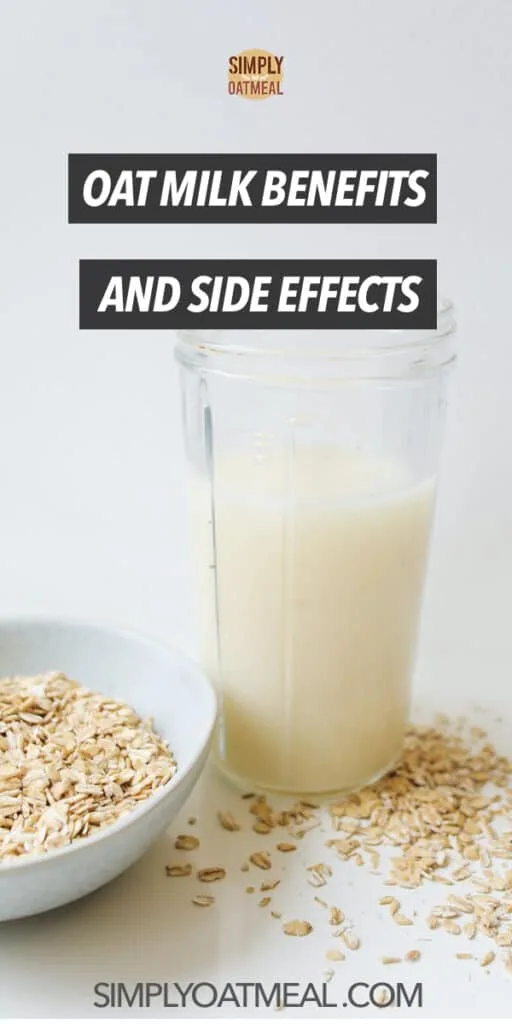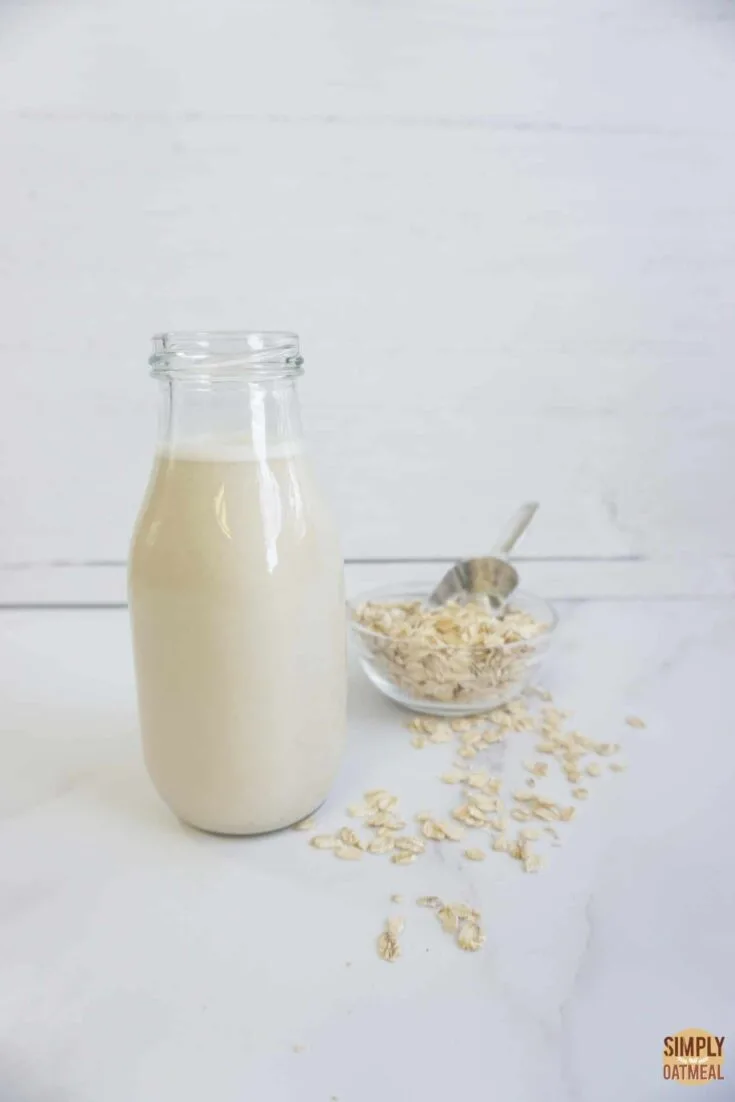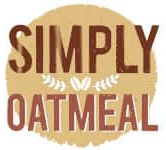Plant-based milk alternatives have become extremely popular and in high demand as well. Oat milk has soared into the spotlight as it is vegan and naturally free of gluten, lactose, nuts and soy.
Many people also have intolerances and allergies that prevent them from consuming cow’s milk or other dairy free beverages. Furthermore, oat milk is very nutritious and offers the health benefits oats.
Nowadays, plant-based milks have become a part of our regular diet with increasing popularity all around the world. You can find a variety of plant-based milks such as almond milk, soy milk and many more, but oat milk has got the star among all.
This article discusses oat milk, its nutrition, benefits, and how to make oat milk from scratch.
Benefits of Oat Milk
Due to its nutrient profile and delicious taste, oat milk is now very popular and you will come across many brands in the supermarket.
But you may question how healthy oat milk really is? So, prior to switching over to oat milk, you should check oat milk benefits and oat milk side effects to evaluate whether it is the right beverage choice for you.
Oat Milk Nutrition
Fortified oat milk is an excellent source of many essential vitamins and minerals, as well as fiber.
One cup (240 ml) of unsweetened, Oatly oat milk contains approximately:
- Calories: 120
- Protein: 3 grams
- Fat: 5 grams
- Carbs: 16 grams
- Dietary fiber: 2 grams
- Vitamin B12: 50% Reference Daily Intake (RDI)
- Riboflavin: 46% RDI
- Calcium: 27% RDI
- Phosphorus: 22% RDI
- Vitamin D: 18% RDI
- Vitamin A: 18% RDI
- Potassium: 6% RDI
- Iron: 2% RDI
Oat milk is made by blending oats with filtered water, and then straining the residual pulp to retain a silk smoothy beverage. The process removes lots of nutrients that are present in a bowl of oatmeal, therefore commercial manufacturers enrich oat milk with the missing nutrients.
What are the pros and cons of oat milk?
Before diving into an oat milk routine, it’s important to evaluate the benefits and potential dangers. As with everything, oat milk also has pros and cons. So, let’s check both of these.
Here is a list of some benefits to consuming oat milk:
- Dairy-free milk: For those with lactose-intolerance, oat milk is a low-fat and dairy-free milk that is both tasty and nutritious. So, oat milk is an excellent choice and also perfect for vegans.
- Nutrient dense: Oat milk is enriched with essential vitamins minerals and antioxidants. So, you can get the normal function of the red blood cell, gives you energy and builds natural immunity.
- High fiber: Oat milk has more dietary fiber than any other plant based beverage. Therefore, it is an excellent source for adding fiber to your regular diet. It can help improve digestion and nutrient absorption.
- Increased heart health: Among their many benefits, beta-glucan are a soluble fiber naturally found in oats that may offer heart health benefits (1).
- Lower cholesterol levels: Oat milk is a dairy-free product and it can also lower the bad cholesterol levels within your body (2, 3, 4).
- Regulates the sugar level: Oat milk has soluble fiber and beta-glucan. For this, oat milk can slow down the absorption level and the insulin supply in the bloodstream. So, it is a healthier choice for type 2 diabetes patients.
- Prevent anaemia: Oat milk contains traces of iron which can help to prevent anaemia.
- Strengthen bone: Oat milk is enriched with calcium and vitamin D that can help to strengthen bones (5, 6, 7).
- Promote weight loss: Oats are fiber rich, which causes a feeling of fullness that can discourage overeating. Avoiding unnecessary cravings can overwhelmingly lead to weight loss as you reduce the caloric intake in relation to energy output.
Now, it is time to check the cons of oat milk:
- Commercial oat milk has filled with additives, preservatives and and artificial flavorings. So, it can affect our digestive system and intestinal flora.
- Oat milk contains lots of added sugars, especially when sweetened. Keep the excess sweetness to a minimum to deter adverse effects.
- Homemade oat milk is not as nutritionally beneficial as commercial oat milk that has been fortified with added vitamins and minerals.
- Oat milk is very expensive compared to cow milk. So, many people cannot afford to buy and consume the beverage.
- You will get more calories if you drink oat milk.
Is oat milk healthier than cow’s milk?
Oat milk is healthier than cow’s milk. Oat milk has many health benefits that cow’s milk does not have, it can lower cholesterol levels and is a better choice for people with type 2 diabetes.
This milk can also boost our immunity as it contains Vitamin A and Vitamin D. Furthermore, it is vegan, lactose free and wheat free.
As you can see, oat milk is healthy and very beneficial for us. Many people cannot tolerate the lactose in cow’s milk, so oat milk is an excellent substitute.
Which is better oat milk or almond milk?
Almond milk is popular among vegans, but oat milk is now considered the best dairy free plant-based milk. Oat milk is the perfect alternative as you don’t need to be worried about encountering a nut allergy.
Both oat milk and almond milk are enriched with vitamins and minerals that provide substantiated nutritional value, but oat milk is likely to contain more B vitamins, while almond milk contributes more vitamin E. But if you want to cut down your calorie level then almond milk is better than oat milk (8, 9).
Overall, oat milk is a perfect option for vegans and people who want to switch over to plant-based beverages.
Is oat milk good for gut health?
Oat milk is good for gut health as it contains a high amount of the soluble fiber beta-glucan, which forms a gel-like substance inside your gut that eases the passage of stool through the intestines.
It can increase the absorption level of nutrients, promote heart health and also lower the cholesterol level. So, we should include oat milk in our regular diet for improved gut health.
No wonder why oat milk is on demand among vegans and health-conscious people.
Oat milk benefits for skin
Oat milk is very much beneficial for skin health. If you add oat milk in your regular diet then, it takes better care of your skin and hair. Oat milk contains a high amount of Vitamin B such as B12 and riboflavin.
Oat milk can reduce cell damage and encourage rapid cell repair. After menopause, women have a deficiency of Vitamin B12 and may suffer from premature hair greying and hair loss issues as well.
Oat milk can also be used in natural body care regimes for face, hair and skin. So, if you want to reduce the skin damage then, oat milk is very much beneficial and appropriate option (10, 11, 12, 13).

Oat milk disadvantages:
Apart from its benefits, there are a few disadvantages of oat milk that you need not brush off. It contains a high amount of sugar preservatives that are not so good for regular consumption.
Here are some more disadvantages of oat milk:
- High in sugar: Commercially manufactured oat milk is high is added sugars, especially if they are sweetened or flavored. That’s why it is recommended to always purchase unsweetened choices to have better control over the amount of sugar that you add.
- Not so nutrient-dense: Homemade oat milk is not fortified like commercial brands and does not have as many nutrients. When you strain the pulp from the liquid, it loses some of the nutritional value comprised in nutritionally dense whole grain oats.
- Not suitable substitute: Oatmeal is good for babies, however you should not give oat milk to a baby as a nutritional substitute to breastmilk or formula. This is not at all suitable milk alternative for babies as it is not a wholesome source of complete nutrition that is required for growth and development.
- A lot of carbohydrates and calories: Commercially manufactured oat milk can contain 130 calories and 25 grams of carbohydrates. So, if you want to opt for a low-calorie diet, then this beverage is not suitable for you.
Oat Milk Side Effects
Oats are not an ingredient that many people find to be problematic, but occasionally there are some oats side effects that occur when first introduced.
The main issue being the high fiber content in oats, when your body is not used to processing much fiber. On the other hand, it is possible to face an oat allergy.
However, one should be aware of the potential oat milk dangers so that you can mitigate any risk before encountering the obstacle.
Here are some possible side effects that you may experience from consuming oat milk:
- Upset stomach: Many people are not used to consuming fiber, so an influx of fiber rich food or beverages can initially cause an upset stomach. For this reason, it is recommended to start will small amounts and slowly increase portion size as your body becomes familiar with consuming the fiber rich foods.
- Diarrhea: Oats are packed with both soluble and insoluble fiber, both of which will cause you to pass stool through the intestines more efficiently. The two types of fiber work together to soften the mass and bulk up the stool, which ultimately makes it easier to work its way through the intestinal tract.
- Gluten sensitivity: Although oats are naturally gluten free, cross contamination of wheat processing machinery is the primary cause of exposure. If you suffer from celiac disease or gluten sensitivity, then purchase gluten free oat milk or make your own with gluten free rolled oats (14).
- Carb heavy: Oats are a whole grain that is carb dense food. The complex carbs are loaded with fiber which slows the digestion and absorption rate of blood sugars, therefore it is not a simple carb that immediately spikes insulin levels.
Apart from its minimal risk factors, oat milk is beneficial and well liked among many dairy free beverage advocates. It is one of the best plant-based milk variants for vegans and health-conscious people, as a result it has seen a significant surge in popularity.

How to Make Oat Milk
A quick and easy homemade oat milk that only uses 2 ingredients and takes just 5 minutes!
Creamy, smooth and naturally sweet, this dairy free milk is a perfect addition to overnight oats, smoothies, granola, baked goods and more!
Ingredients
Oat Milk Base Recipe
- 1 cup rolled oats
- 4 cups water
- 1 pinch salt (optional)
- ½ teaspoon vanilla extract (optional)
Sweetened
- 2 whole dates, pitted (optional)
- 2 tablespoons maple syrup (optional)
- 1 tablespoon molasses (optional)
Chocolate Milk
- 2 tablespoons cocoa powder (optional)
Berry Milk
- ½ cup fresh berries (optional)
Instructions
- Add rolled oats, water, salt, and any flavored oat milk add-ins (optional) to a high-speed blender. Secure the lid and cover with a towel to prevent any splatter.
Blend for 30 seconds or until the liquid seems to come together. In fact, over-blending can make the oat milk slimy in texture, so it doesn’t have to be 100% pulverized. - Taste a small sample with a spoon to test the flavor and sweetness; adjust accordingly.
- Line a large bowl or pitcher with a clean cloth, a thin kitchen towel or tee shirt works great. The oat milk will be extra smooth and creamy if you filter the liquid twice to remove the excess oat pulp. A fine mesh strainer, nut milk bag and cheese cloth passed too much residue.
- Transfer the strained oat milk to an airtight container and refrigerate. Will stay fresh in the refrigerator for 5 days. Shake well before serving and enjoy cold. DO NOT HEAT or the liquid will thicken into a gravy or sauce like consistency.
Notes
- You can use quick oats or steel-cut oats, but they tend to make the oat milk gummy and slimy.
- Nutrition information is a rough estimate calculated with the weight of the oat “pulp” subtracted from the nutritional content.
Nutrition Information:
Yield:
8Serving Size:
1Amount Per Serving: Calories: 39Total Fat: 1gSaturated Fat: 0gTrans Fat: 0gUnsaturated Fat: 0gCholesterol: 0mgSodium: 22mgCarbohydrates: 7gFiber: 1gSugar: 0gProtein: 1g
